| August Resource | 50 Solution-Oriented Program Templates for Challenges in Relief, Development & Adaptation |
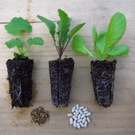 |
Here are a range of solutions in the form of programs and activities that past students have used successfully in addressing project challenges. Feel free to use them, modify them, or develop your own solutions instead. Many of the programs are highly specific to one student’s project and will need to be adapted to fit yours. Many of the programs have multiple activities; these are to give you options for customizing your own programs: edit the activities down as you see fit for your project.
Also, be sure to visit: Student Countries and Project Challenges. |
| Risk & Vulnerability in a Remote Tanzanian Village | |
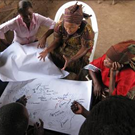 |
Chris Enns & Catalina Gheorghe are doing a community-based adaptation to climate change project in Wagete village, Tanzania, impacting 4,000 villagers. Their project is a ‘mainstreamed’ project—they are incorporating adaptation to climate change activities into a traditional rural development project. |
|
They have a healthcare & education component— and for adaptation—a soil and water conservation program, and a farmer extension program. Detailed project outline & great photos at link. They’ve been determining their risks and vulnerabilities to climate change by combining scientific data with local community knowledge. Chris and the community developed a list of local resources, hazard maps, a seasonal calendar & a historical timeline.
|
|
| CC Study in Injustice: 10 Million Additional African Children Malnourished by 2050 | |
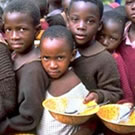 |
The World Food Program estimate that globally, 10-20 percent more people will be at risk of hunger by 2050 than would be without climate change. Of these, almost all will be in developing countries, with 65 percent expected to be in Africa. This has severe implications for nutrition, particularly for children.
|
|
In sub-Saharan Africa, it is estimated that 10 million more children will be malnourished as a result of climate change.
|
|
| August Field Guide | Agricultural Soil and Water Management for Sloping Land. |
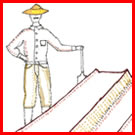 |
Subsistence farmers suffer not only from depleted soils but from challenges with water: too little water, too much water, and erosion from water. This field guide looks at different ways of developing barriers on farm fields for stopping the flow of water so that it can percolate into the soil and build up soil moisture.
|
|
These barriers reduce soil erosion by catching topsoil carried by water and offer the added benefit of creating level planting areas behind the barriers as the soil accumulates. Barriers can be terraces, stone and earth walls called bunds, or living barriers such as hedges and grass strips. Follow the link to download the field guide, workshop lesson plan and how-to card.
|
|
| Do you think that local/indigenous knowledge should be incorporated into adaptation to climate change projects? | |
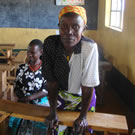 |
Stephen Oluoch, Kenya, met again with his target community to gain a better understanding of their knowledge of climate change, challenges that they are experiencing attributable to climate change, and activities that they have begun on their own using indigenous knowledge to adapt to their changing situation. |
|
Here is one list that resulted from this participatory exercise: Vulnerability Matrix 1: What is a prioritization of the community’s greatest hazards they face?
|
|
| Student Grant Award | CSDi student Martin Sishekanu wins grant award for course project |
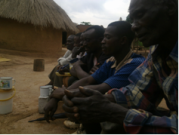 |
Martin Sishekanu (Zambia) and course partner Ursula Flossmann-Kraus (Germany/Philippines) have just completed the third course of the four course diploma program on Community-Based Adaptation To Climate Change. Students develop documents in the courses which are suitable for presentation to donors—and Martin just got the good news that he has received a grant award for an agricultural income generation component of their project. Congratulations Martin!
|
- An Agricultural Income Generation Program
- An Animal Husbandry Program
- A Land-Use Management Plan
- A Climate Smart Agricultural Practices Program
| Family Gardens | Food Security and Nutrition |
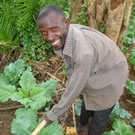 |
For many people living in the cycle of poverty, the idea of starting a kitchen garden might seem overwhelming. It could be the time investment, it might be perceived costs. It might be a lack of know-how: what to plant, how to plant and how to care for a garden. However, the positive benefits make it worthwhile enabling community members in gardening for nutrition.
|
|
Start small, think simple. The purpose of the first year’s garden is to give the participants a win—so that they will be encouraged to plant again the following year. Even if they plant only one bed, 1 meter by 4 meters, they should be able to get positive, delicious, nutritious results. Follow the link to download the field guide and how-to card.
|
|
| Project of the Month | Martha Njoroge’s home garden program for HIV+ children in Kenya |
 |
Martha works with the Wamumbi Orphan Care as a Project Manager organizing events for the orphaned children they support. Martha has partnered with Kathy Tate-Bradish (US) and Genevieve Lamond (UK). Follow the link to see field reports and photos.Martha, Kathy and Genevieve have developed a project which includes these programs:
|
|
|
| News from the Field |
CSDi students face critical danger in the communities where they work |
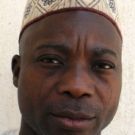 |
Suleiman Barau Kadana works for People Oriented Development of ECWA as a facilitator and training officer in northern Nigeria. Sule is just finishing his second course at CSDi—he has one more assignment to turn in and he has just written:
“Regarding my week 6 assignment—due to tension in Northern Nigeria I am unable to get it done.” The Boko Haram bombed 3 Christian churches in his town on the 17th—50 people died.
|
|
I’m impressed that field staff working under dangerous conditions and taking our courses continue to develop their projects, send in reports & assignments—and sign up for new courses.
|
|
Would you like to learn how to develop Community Based Adaptation Projects?
Please write us with your stories, thoughts and comments through Online.Learning@csd-i.org







